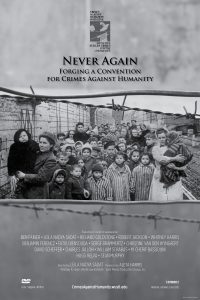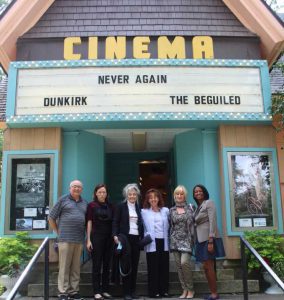By: Fizza Batool
 The Whitney R. Harris World Law Institute at Washington University School of Law is proud to announce that the film Never Again: Forging a Convention for Crimes Against Humanity has been accepted to the 26th Annual St. Louis International Film Festival (SLIFF).
The Whitney R. Harris World Law Institute at Washington University School of Law is proud to announce that the film Never Again: Forging a Convention for Crimes Against Humanity has been accepted to the 26th Annual St. Louis International Film Festival (SLIFF).
The festival will take place from November 2-12, 2017 and Never Again will be screened as part of its Human Rights Spotlight selection on November 11th, 2017 at 12:30 p.m. at Washington University’s Brown Hall. The Festival’s Human Rights Spotlight features a selection of documentaries which focus on human rights issues both in the United States and around the world. The films are free and open to the public, and include conversations with film directors and/or post-screening discussions with experts.
 Never Again is the culmination of years of hard work and effort to raise awareness for the need to create a global convention on crimes against humanity—widespread, systematic atrocities committed against civilian populations. The film chronicles the slow but steady effort to develop a global treaty to prevent and punish crimes against humanity by featuring testimony of survivors of such crimes as well as calls by prominent international experts who have been working tirelessly to advocate for the adoption of a new global treaty by the international community. Never Again was produced by the Crimes Against Humanity Initiative—a multi-year rule of law project at Washington University School of Law in St. Louis— under the direction of Professor Leila Sadat, Director of the Whitney R. Harris World Law Institute, and by Spot Media Production Group. For additional information about the film or to view a trailer, visit the film webpage at this link.
Never Again is the culmination of years of hard work and effort to raise awareness for the need to create a global convention on crimes against humanity—widespread, systematic atrocities committed against civilian populations. The film chronicles the slow but steady effort to develop a global treaty to prevent and punish crimes against humanity by featuring testimony of survivors of such crimes as well as calls by prominent international experts who have been working tirelessly to advocate for the adoption of a new global treaty by the international community. Never Again was produced by the Crimes Against Humanity Initiative—a multi-year rule of law project at Washington University School of Law in St. Louis— under the direction of Professor Leila Sadat, Director of the Whitney R. Harris World Law Institute, and by Spot Media Production Group. For additional information about the film or to view a trailer, visit the film webpage at this link.

From left to right: James Johnson, Theresa Galakatos, Anna Harris, Professor Leila Sadat, Judge Christine Van den Wyngaert, and Bethel Mandefro at the Chautauqua Cinema.
The film was recently shown at the 11th Annual International Humanitarian Law Dialogs in Chautauqua, New York to community members, academics, and international law experts. After the screening, a Q&A was held with the director, Leila Sadat, and ICTY Prosecutor Kevin Hughes, former ECCC Prosecutor Robert Petit, and Judge Christine Van den Wyngaert of the ICC, discussing the film. The panel received positive responses from audience members and thoughtful questions.
As governments, international organizations, and individuals share their comments and observation on the full draft treaty submitted by the UN International Law Commission, it is vital that this film be circulated across the nation and around the world to generate a powerful wave of action to advocate for justice in our ever so complicated and conflict ridden world.
